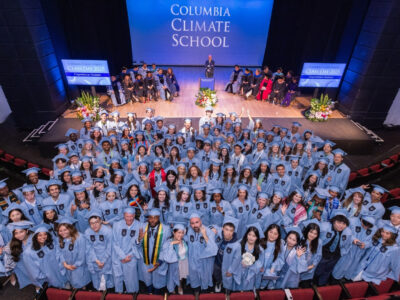Posts
-

Student Spotlight: For This MA Candidate, the Path to Climate Policy Is Personal
Saira Ramirez Mingueta plans on working at the intersection of climate justice, public health and policy.
-

Leveraging the Power of Open Source Data To Map the World’s Oceans
In honor of World Oceans Day, marine geophysicist Vicki Ferrini discusses the current state of ocean research, and the important role international collaboration plays in this field.
-

Student Spotlight: Advancing Equity Through Clean Energy Policy
Nicholas Britton, a student in Columbia’s MPA-ESP program, believes equitable energy access is a fundamental human right and a powerful lever for climate and equity solutions.
-

A Composer’s Instrumental Ode to the Arctic Circle
Environmental sound artist Mary Edwards turns field recordings of glacial phenomena in Svalbard into a collaborative musical performance.
-

Playing With Fire: Harnessing Lava To Build Sustainable Cities
A futuristic new project imagines the possibility of molding lava into building material, thereby reducing the carbon emissions associated with construction.
-

Gen Z Leads the Call for Conservation With TreeTalks
Two MPA-ESP students hosted a film screening and discussion on rainforest conservation and the role of young people in shaping its future.
-

Chance, Connection and Climate Change on the Greenland Ice Sheet
Documentary film “The Color of Ice” explores the voices impacted by climate change.
-

What a Year of Climate Research Taught Me About Resilience
High school senior Michelle Rozenfeld reflects on what she learned interning with the National Center for Disaster Preparedness.
-

Congratulations to the 2025 Graduates of the Columbia Climate School
On May 16, M.A. in Climate and Society students gathered to celebrate their accomplishments.